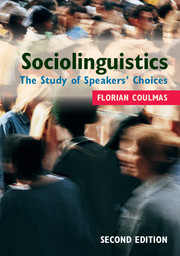Book contents
- Frontmatter
- Contents
- List of figures
- List of tables
- Preface to the second edition
- 1 Introduction: notions of language
- Part I Micro-choices
- 2 Standard and dialect: social stratification as a factor of linguistic choice
- 3 Gendered speech: sex as a factor of linguistic choice
- 4 Communicating across generations: age as a factor of linguistic choice
- 5 Choice and change
- 6 Politeness: cultural dimensions of linguistic choice
- Part II Macro-choices
- Glossary of terms
- References
- Index
- References
2 - Standard and dialect: social stratification as a factor of linguistic choice
Published online by Cambridge University Press: 05 August 2013
- Frontmatter
- Contents
- List of figures
- List of tables
- Preface to the second edition
- 1 Introduction: notions of language
- Part I Micro-choices
- 2 Standard and dialect: social stratification as a factor of linguistic choice
- 3 Gendered speech: sex as a factor of linguistic choice
- 4 Communicating across generations: age as a factor of linguistic choice
- 5 Choice and change
- 6 Politeness: cultural dimensions of linguistic choice
- Part II Macro-choices
- Glossary of terms
- References
- Index
- References
Summary
The Standard language was the possession only of the well-born and the well-educated.
J. E. Dobson (1956)Outline of the chapter
This chapter describes the social dimensions of dialects, demonstrating that choice of words, pronunciation and other linguistic features has been observed to reflect speakers’ social position in various speech communities. It then goes on to explain how dialectal and standard speech should be conceptualized for purposes of sociolinguistic investigation. These notions are always interrelated, but do not mean the same thing in all speech communities. The same holds true for the concept of social structure. Social stratification changes over time, and the factors determining class are not the same in all places. Only empirical research can show how social structure is reflected in linguistic variation. At the outset of every sociolinguistic study, it is accordingly necessary to determine the relevant parameters of social stratification and how standard and dialect relate to each other. Network analysis and accommodation theory are briefly introduced as analytic tools, which are particularly useful at a time of rapid social change and technology driven change in communications.
- Type
- Chapter
- Information
- SociolinguisticsThe Study of Speakers' Choices, pp. 19 - 41Publisher: Cambridge University PressPrint publication year: 2013



